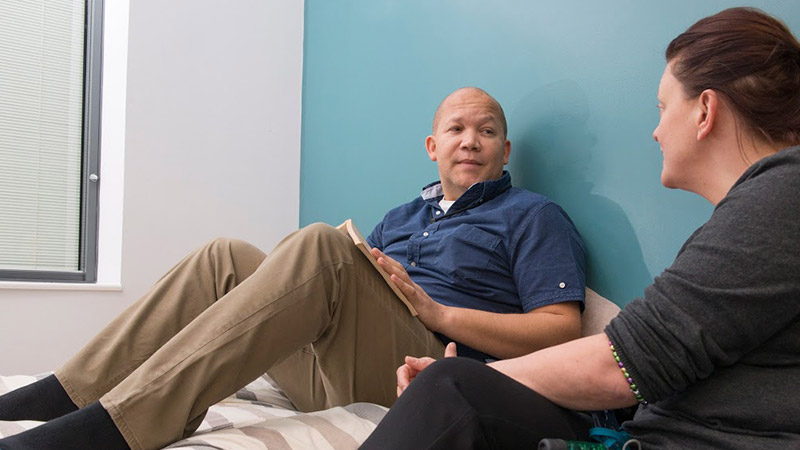Nursing (Mental Health)
MSc
Start dates: September 2026
Full time: 3 years
Part time: 3-8 years
Location: Headington (Marston Road site)
School(s): Oxford School of Nursing and Midwifery
Overview
Mental health concerns – from identity issues to substance abuse, isolation to adverse childhood experiences – and demand for services, has increased in recent years. And in a world where the stigma around mental health persists, the need for dedicated and empathetic mental health nurses has never been more evident.
Whatever your academic or professional background, learn from our internationally renowned clinicians, researchers and academics and prepare to be a leader in healthcare. We’ll teach you skills for evidence-based practice, problem-solving, and collaborative working to meet the changing needs of the healthcare system.
You’ll receive support from your academic adviser, be inspired by guest lecturers, hear lived experiences, and access our state-of-the-art simulation suite. Not only that, but you’ll build competence through a range of mental health placements across Oxfordshire and beyond.
By the end, you’ll be able to contribute significantly to high-quality client care, deliver nursing interventions, and apply your knowledge to real-life situations.

Why Oxford Brookes University?
-
Unbeatable opportunities
Develop quickly as you experience mental health placements in a variety of settings, from children and young people to older adults, crisis intervention to rehabilitation.
-
Home to experts
Taught by highly experienced and enthusiastic nurse academics, your studies will be informed by the latest developments in the field.
-
Enviable partnerships
Apply your knowledge and skills in various NHS Trusts – not just in Oxfordshire, but in Wiltshire, Berkshire and beyond, helping you to really expand your network.
-
Be at the cutting edge
We work closely with Oxford Health to develop interprofessional simulations, being 1 of only 19 universities accredited to provide additional hours for simulated learning.
Course details
Research
The Oxford Institute for Applied Health Research (OxINAHR) is an Oxford Brookes University-led partnership of key stakeholders which leads and participates in world class research and evidence-based practice.
We have researchers with a range of experience, working in established areas including:
- cancer care
- children and families
- drugs and alcohol
- physical rehabilitation and enablement
- interprofessional education and collaborative practice.

Careers
A whole host of employers across the country and around the world are looking for qualified mental health nurses. There are NHS hospital wards such as psychiatric and specialist units, community settings such as GP surgeries, schools and prisons, the armed forces and mental health charities. You won’t be short of opportunities.
Our graduates are recognised as having excellent competence and confidence in the field, thanks to multiple placements, our simulation suite, and visiting speakers. With half of the course focused on working in practice, you would have built up a strong network of employers to contact.
Finishing with a professional qualification as a mental health nurse, you’ll be well prepared to register and work as a staff nurse in a range of settings. And with your completed research project and master’s level knowledge, you’ll soon be able to open the door to careers at band 6, 7 and 8. You could then step into more senior roles such as advanced clinical practice, research, nurse education or management.
Entry requirements
Specific entry requirements
GCSE: GCSE Maths, Science and English at Grade C or above. For English and Maths, Level 2 Functional Skills are accepted as alternatives to GCSEs.
A minimum of a second class honours degree (2:2) or equivalent overseas degree from a recognised institution.
Please also see the University's general entry requirements.
Screening
All applicants will be screened for fitness to practise and a Disclosure and Barring Service (DBS) check will be made.
Selection process
All Oxford Brookes University Health and Social Care Programmes conduct Value Based Recruitment (VBR). We recognise that values and attitudes have the greatest impact on the quality of people's care and their experiences.
VBR is a way of helping our Programme recruitment teams to assess the values, motives and attitudes of those who wish to work with people in health and social care settings. When we refer to values we mean, for example, the values included in the NHS constitution.
VBR focuses on 'how' and 'why' an applicant makes choices in how they act and seeks to explore reasons for their behaviour. Further details about the VBR framework can be found here.
English language requirements
For applicants whose first language is not English, an Academic IELTS score of 6.5 (with 6.5 in Reading and Writing, and 6.0 in Listening and Speaking) is required.
Please also see the University's standard English language requirements.
Pathways courses for international and EU students
We offer a range of courses to help you meet the entry requirements for your postgraduate course and also familiarise you with university life in the UK.
Take a Pre-Master's course to develop your subject knowledge, study skills and academic language level in preparation for your master's course.
If you need to improve your English language, we offer pre-sessional English language courses to help you meet the English language requirements of your chosen master’s course.
English requirements for visas
If you need a student visa to enter the UK you will need to meet the UK Visas and Immigration minimum language requirements as well as the University's requirements. Find out more about English language requirements.
Terms and conditions of enrolment
When you accept our offer, you agree to the Terms and Conditions of Enrolment. You should therefore read those conditions before accepting the offer.
International qualifications and equivalences
How to apply
Application process
Tuition fees
Tuition fees
Fees quoted are for the first year only. If you are studying a course that lasts longer than one year, your fees will increase each year.
Please note, tuition fees for Home students may increase in subsequent years both for new and continuing students in line with an inflationary amount determined by government. Oxford Brookes University intends to maintain its fees for new and returning Home students at the maximum permitted level.
For further information please see our tuition fees FAQs.
Tuition fees for International students may increase in subsequent years both for new and continuing students.
The following factors will be taken into account by the University when it is setting the annual fees: inflationary measures such as the retail price indices, projected increases in University costs, changes in the level of funding received from Government sources, admissions statistics and access considerations including the availability of student support.
How and when to pay
Tuition fee instalments for the semester are due by the Monday of week 1 of each semester. Students are not liable for full fees for that semester if they leave before week 4. If the leaving date is after week 4, full fees for the semester are payable.
- For information on payment methods please see our Make a Payment page.
- For information about refunds please visit our Refund policy page
Financial support and scholarships
All eligible nursing students on courses from September 2020 (new and continuing) will receive a payment of at least £5,000 a year which they will not need to pay back. For more information please visit NHS Learning Support Fund (LSF).
Additional costs
Please be aware that some courses will involve some additional costs that are not covered by your fees. Specific additional costs for this course are detailed below.
Please be aware that some courses will involve some additional costs that are not covered by your fees. Specific additional costs for this course are detailed below.
Additional costs for this course are as follows:
- Books and other learning resources
- Exchanges
- Library loans and fees
- Living costs at university
- Graduation
- Photocopying and printing of posters
- Travel to and from placement (if eligible can apply for reimbursement via NHS learning support fund)
- Shoes for practice
- Equipment for practice and suitable non clinical clothing for placements.
This list is not exhaustive and other course-specific costs may be incurred.
For the most up-to-date information on additional costs, please keep checking the website as we will update this as further information becomes available.
Programme changes:
On rare occasions we may need to make changes to our course programmes after they have been
published on the website. For more information, please visit our
changes to programmes page.


